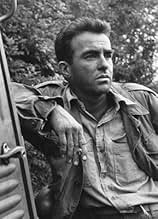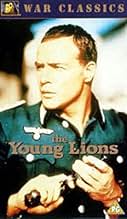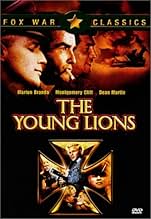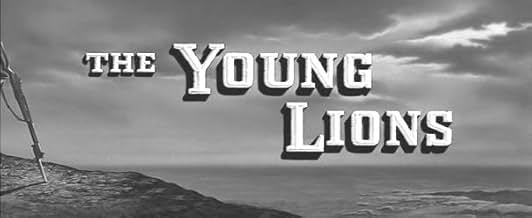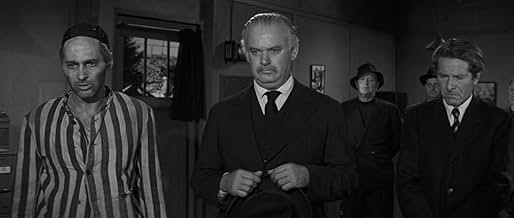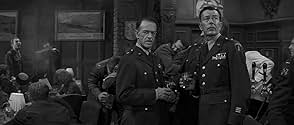IMDb RATING
7.1/10
9.4K
YOUR RATING
The lives of three young men, a German and two Americans, during WWII.The lives of three young men, a German and two Americans, during WWII.The lives of three young men, a German and two Americans, during WWII.
- Nominated for 3 Oscars
- 1 win & 7 nominations total
John Alderson
- Cpl. Kraus
- (uncredited)
John Banner
- German Town Mayor
- (uncredited)
Stephen Bekassy
- German Major
- (uncredited)
- Director
- Writers
- All cast & crew
- Production, box office & more at IMDbPro
Featured reviews
An interesting vision of young men in war. The idealist, the shy and the playboy get to war. All will be changed by the horror of the conflict, not only with enemy troops, but within their ranks.
Lt. Christian Diestl's (Marlon Brando) sense of honor and gentle behavior clashes with the cruel, senseless attitude of his superior, Capt. Hardenberg, realistically played by Maximilian Schell.
Private Ackerman (Montgomery Clift) a shy unassuming Jewish boy becomes a courageous soldier, opposing both enemy soldiers and the bigotry of their comrades.
Private Withacre, a playboy who tries to avoid duty (Dean Martin), finally ends up resigning a safe post to join the fighting in Normandy, and becoming a soldier.
The usual Black and White shooting enhances the cruelty of WWII. If you find it, don't miss this performance by great actors.
Lt. Christian Diestl's (Marlon Brando) sense of honor and gentle behavior clashes with the cruel, senseless attitude of his superior, Capt. Hardenberg, realistically played by Maximilian Schell.
Private Ackerman (Montgomery Clift) a shy unassuming Jewish boy becomes a courageous soldier, opposing both enemy soldiers and the bigotry of their comrades.
Private Withacre, a playboy who tries to avoid duty (Dean Martin), finally ends up resigning a safe post to join the fighting in Normandy, and becoming a soldier.
The usual Black and White shooting enhances the cruelty of WWII. If you find it, don't miss this performance by great actors.
I have seen this movie several times and catch something different every time I see it. Today is the first time I've seen it from the beginning. In the context of the time it was made, it was a bold statement about the human factor in any war. Brando shines and plays a sympathetic character who sees first hand the evil that men do in the name of patriotism.
Made at a time when the Americans that liberated the concentration camps were in their prime and there weren't any idiots running around claiming it was a lie, we see how ordinary citizens respond to the unthinkable. Brando's character stands in for the citizens of the Reich who claimed they were clueless about the genocide while the ashes from the smokestacks fell like snow on their towns. We see the horror and the denial.
It briefly explores a major taboo--interracial/interfaith marriages. It looks at racism in the context of anti-Semitcism (unfortunately still alive and well in America) and one man's courage in opposing it. Ironic this brand of racism, as the founder of the prevelant religion in America was a Jewish rabbi.
This movie is worth the 3 hours of time; it would make a great set piece with "Judgement at Nuremberg" which also showcases the talents of many of the actors from this film.
Good acting from all players in this film. It presages Robert Altman with the interweaving of the characters' lives from the first shot where Barbara Rush and Brando debate the merits of the Fatherland to the last scene in the forest where the end comes full circle.
Made at a time when the Americans that liberated the concentration camps were in their prime and there weren't any idiots running around claiming it was a lie, we see how ordinary citizens respond to the unthinkable. Brando's character stands in for the citizens of the Reich who claimed they were clueless about the genocide while the ashes from the smokestacks fell like snow on their towns. We see the horror and the denial.
It briefly explores a major taboo--interracial/interfaith marriages. It looks at racism in the context of anti-Semitcism (unfortunately still alive and well in America) and one man's courage in opposing it. Ironic this brand of racism, as the founder of the prevelant religion in America was a Jewish rabbi.
This movie is worth the 3 hours of time; it would make a great set piece with "Judgement at Nuremberg" which also showcases the talents of many of the actors from this film.
Good acting from all players in this film. It presages Robert Altman with the interweaving of the characters' lives from the first shot where Barbara Rush and Brando debate the merits of the Fatherland to the last scene in the forest where the end comes full circle.
Lt. Christian Diestl (Marlon Brando) is a dutiful German who finds the war more and more troubling. Meanwhile back in the US, Jewish Noah Ackerman (Montgomery Clift) finds love, and entertainer Michael Whiteacre (Dean Martin) try to avoid the war.
This movie is split in three. I find the Marlon Brando part very intriguing right from the start. A straight movie with just his character would be very interesting. Brando sets a serious compelling tone. Clift and Martin's movie starts slowly. Quite frankly, it starts as an old fashion melodramatic romance with puppy dog Montgomery Clift. Martin has even less to do as he debates whether to join the fight or not. The movie crawls along at times, and would probably be better served to just keep Brando. Although Clift has some minor drama. At 167 minutes, this is like 2 movies jammed into one. The connection between the stories is tenuous at best until the very end. It seems it took forever to get there. Once there, the point of the movie is made crystal clear, but it seems that it could have been done with a much tighter story.
This movie is split in three. I find the Marlon Brando part very intriguing right from the start. A straight movie with just his character would be very interesting. Brando sets a serious compelling tone. Clift and Martin's movie starts slowly. Quite frankly, it starts as an old fashion melodramatic romance with puppy dog Montgomery Clift. Martin has even less to do as he debates whether to join the fight or not. The movie crawls along at times, and would probably be better served to just keep Brando. Although Clift has some minor drama. At 167 minutes, this is like 2 movies jammed into one. The connection between the stories is tenuous at best until the very end. It seems it took forever to get there. Once there, the point of the movie is made crystal clear, but it seems that it could have been done with a much tighter story.
"The Young Lions" was one those big Hollywood war movies I remember seeing with my family at the local cinema during the late 1950s.
I saw many of those films and actually read most of the slab-like novels they were based on: "Battle Cry", "The Man in the Gray Flannel Suit", "From Here to Eternity" and Irwin Shaw's "The Young Lions" - there just weren't that many competing devices back then.
I usually read the books after seeing the films and then became acutely aware of how the movies suffered under the censorship of the day. The novels often filled in some serious gaps in my sex education, but the films never did.
The story is about three soldiers: a German, Christian Diestl (Marlon Brando), and two Americans: Noah Ackerman (Montgomery Clift) and Michael Whiteacre (Dean Martin). The film follows their fortunes through WW2 until they cross paths at the end.
The film has a number of authentic, well-executed sequences shot on location. However these are mixed with flat, over-lit scenes shot on the blandest of backlots and soundstages - the interiors are particularly artless. Documentary footage also added to the lack of a definitive style.
Fortunately the action scenes open the film out. The most arresting of them was the ambush of a British convoy in North Africa. It would have touched a nerve with many in that audience in 1958 as our guys had been part of the British Eighth army and the war had only been over for 13 years.
One of the surprises in the movie was the anti-Semitism Noah Ackerman encounters in the U.S. Army. Monty Clift faced a tough enlistment in "From Here to Eternity", but it was even tougher here. He looked worn (this was after his accident in 1956) and seemed a bit too old, but his performance is the most affecting in the film. No wonder Brando was wary of his talent.
Dean Martin without Jerry Lewis was another surprise, but he was good as the soldier with better motives than he thought.
Brando's blonde, broad shouldered Diestl starts out as a fine example of the master race, but his journey through the rise and fall of the Third Reich makes him thoughtful. He is treated rather sympathetically in the movie, although he was more of a nasty Nazi in the novel. However they may have overdone Diestl's disgust at every turn.
I can see why Irwin Shaw was disappointed. However the film has its moments, and is still one I have no trouble watching every now and then.
I saw many of those films and actually read most of the slab-like novels they were based on: "Battle Cry", "The Man in the Gray Flannel Suit", "From Here to Eternity" and Irwin Shaw's "The Young Lions" - there just weren't that many competing devices back then.
I usually read the books after seeing the films and then became acutely aware of how the movies suffered under the censorship of the day. The novels often filled in some serious gaps in my sex education, but the films never did.
The story is about three soldiers: a German, Christian Diestl (Marlon Brando), and two Americans: Noah Ackerman (Montgomery Clift) and Michael Whiteacre (Dean Martin). The film follows their fortunes through WW2 until they cross paths at the end.
The film has a number of authentic, well-executed sequences shot on location. However these are mixed with flat, over-lit scenes shot on the blandest of backlots and soundstages - the interiors are particularly artless. Documentary footage also added to the lack of a definitive style.
Fortunately the action scenes open the film out. The most arresting of them was the ambush of a British convoy in North Africa. It would have touched a nerve with many in that audience in 1958 as our guys had been part of the British Eighth army and the war had only been over for 13 years.
One of the surprises in the movie was the anti-Semitism Noah Ackerman encounters in the U.S. Army. Monty Clift faced a tough enlistment in "From Here to Eternity", but it was even tougher here. He looked worn (this was after his accident in 1956) and seemed a bit too old, but his performance is the most affecting in the film. No wonder Brando was wary of his talent.
Dean Martin without Jerry Lewis was another surprise, but he was good as the soldier with better motives than he thought.
Brando's blonde, broad shouldered Diestl starts out as a fine example of the master race, but his journey through the rise and fall of the Third Reich makes him thoughtful. He is treated rather sympathetically in the movie, although he was more of a nasty Nazi in the novel. However they may have overdone Diestl's disgust at every turn.
I can see why Irwin Shaw was disappointed. However the film has its moments, and is still one I have no trouble watching every now and then.
"The Young Lions" is a black & white 1958 WW2 drama featuring Marlon Brando, Dean Martin and Montgomery Clift.
The film attempts to show the German, American and French sides of the war. Brando stars as a young German officer who becomes increasingly disillusioned with Hitler's regime and the world war he started. Meanwhile Martin plays a worldly Broadway musician who struggles with cowardice whereas Montgomery Clift's character is a poor, naive Jewish American who falls in love with with a winsome lass (Hope Lange) and fights the anti-semitic guys in his platoon.
Marlon's performance illustrates why he's considered the greatest actor in cinema; he's just captivating. Most reviewers note that Brando's German storyline is more interesting than the two American story lines, which is true, but repeat viewings grant the viewer more appreciation for the latter.
There are three stunning women featured in the picture: Barbara Rush, May Britt and Liliane Montevecchi. Rush is Martin's marriage-minded gal, who flirts with Brando early on; Britt plays the luscious sexpot wife of Brando's captain (Maximilian Schell); and Montevecchi performs as a French girl who initially insults Brando's character (because he's a German invader).
It should be pointed out that "The Young Lions" is not a war action film, but rather a powerful war DRAMA. Yes, there's quite a bit of action (France, Northern Africa, etc.), but the emphasis is on the characters and their stories. The climax involves a horrified and utterly disillusioned Brando, leaving a strong impact.
FINAL WORD: If you're looking for a mindless action flick this is not the one to see. This perhaps explains some of the less-than-stellar reviews. Yet, make no mistake, "The Young Lions" is without a doubt a WAR film. It's also a masterpiece of cinematic art, not to mention one of Brando's most mesmerizing performances.
The film runs 2 hours, 47 minutes.
GRADE A-
The film attempts to show the German, American and French sides of the war. Brando stars as a young German officer who becomes increasingly disillusioned with Hitler's regime and the world war he started. Meanwhile Martin plays a worldly Broadway musician who struggles with cowardice whereas Montgomery Clift's character is a poor, naive Jewish American who falls in love with with a winsome lass (Hope Lange) and fights the anti-semitic guys in his platoon.
Marlon's performance illustrates why he's considered the greatest actor in cinema; he's just captivating. Most reviewers note that Brando's German storyline is more interesting than the two American story lines, which is true, but repeat viewings grant the viewer more appreciation for the latter.
There are three stunning women featured in the picture: Barbara Rush, May Britt and Liliane Montevecchi. Rush is Martin's marriage-minded gal, who flirts with Brando early on; Britt plays the luscious sexpot wife of Brando's captain (Maximilian Schell); and Montevecchi performs as a French girl who initially insults Brando's character (because he's a German invader).
It should be pointed out that "The Young Lions" is not a war action film, but rather a powerful war DRAMA. Yes, there's quite a bit of action (France, Northern Africa, etc.), but the emphasis is on the characters and their stories. The climax involves a horrified and utterly disillusioned Brando, leaving a strong impact.
FINAL WORD: If you're looking for a mindless action flick this is not the one to see. This perhaps explains some of the less-than-stellar reviews. Yet, make no mistake, "The Young Lions" is without a doubt a WAR film. It's also a masterpiece of cinematic art, not to mention one of Brando's most mesmerizing performances.
The film runs 2 hours, 47 minutes.
GRADE A-
Did you know
- TriviaMontgomery Clift was widely felt to look too old and unhealthy to be an A1 soldier. Although Clift was only 36 during filming, this was the first full film he had made since his near-fatal 1956 car accident (it occurred during filming of L'arbre de vie (1957)), which had drastically altered his appearance.
- GoofsEarly in the movie, Marlon Brando's character is riding in some sort of staff car. The car is right-hand drive; the Germans did not use right-hand drive. However, the staff car is a French-made Laffly V15T, which is, indeed, right-hand drive and was used by the French Army in WWII. The vehicle was probably captured from the French Army.
- Quotes
Michael Whiteacre: You want me to get shot. Look, I've read all the books. I know that in 10 years we'll be bosom friends with the Germans and the Japanese. Then I'll be pretty annoyed that I was killed.
- ConnectionsFeatured in V.I.P.-Schaukel: Episode #8.2 (1978)
Details
Box office
- Budget
- $3,550,000 (estimated)
- Gross worldwide
- $9,363
- Runtime
- 2h 47m(167 min)
- Color
- Sound mix
- Aspect ratio
- 2.35 : 1
Contribute to this page
Suggest an edit or add missing content


